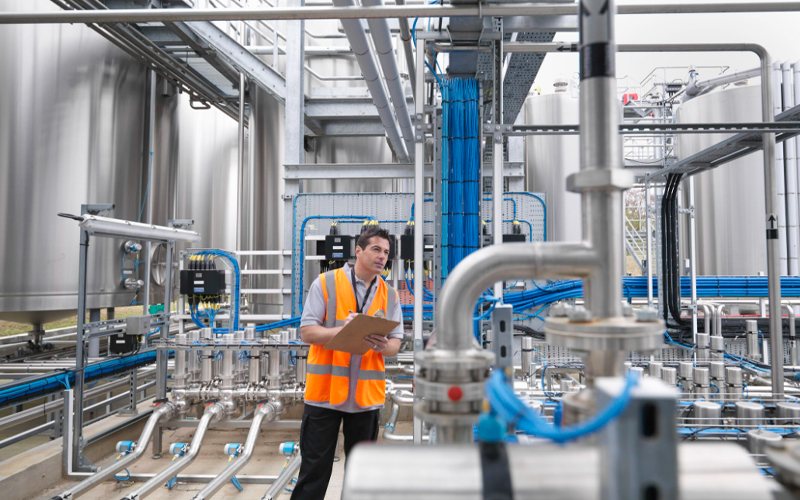Digital transformation is no longer a step few businesses take to gain a competitive edge but has become a must to survive in today’s market. This has resulted in experts estimating the global digital transformation market to grow to $1009.8 billion by 2025 at a 16.5% CAGR. The same is true for digital transformation in manufacturing, as experts estimate the market to reach $767 billion by 2026 at a 19.48% CAGR.
However, despite manufacturing professionals understanding the urgency and importance of digitising their operations, only 39% of professionals feel they have a well-defined digital transformation strategy. Moreover, 66% feel their companies are lagging and must step up their transformation efforts to stay competitive. But integrating manufacturing and digital transformation is easier said than done as many companies struggle to overcome the transformation challenges.
Digital transformation in manufacturing
Over the last few years, rapidly advancing technologies have drastically changed the manufacturing industry. From production to logistics, IoT and other innovations have revolutionised how manufacturers operate. But to understand the true meaning of digital transformation in the manufacturing industry, it is necessary to understand and acknowledge the four areas that are crucial to achieving true transformation:
- Business model transformation (changing how businesses operate)
- Domain transformation (fostering new opportunities and markets)
- Cultural transformation (changing attitudes towards technology)
- Process transformation (integrating next-gen technologies in the manufacturing process)
Without comprehensive strategic efforts to encompass all four categories achieving digital transformation may be difficult.
Challenges preventing digital transformation in the manufacturing industry
The complexities involved in the manufacturing industry and the comprehensive efforts needed for successful digital transformation make it challenging for manufacturing professionals to truly embrace digital transformation. Although many factors hinder digital transformation in the manufacturing industry, we can usually classify them into four categories, namely:
-
Skills gap
-
Adoption of new technologies
-
Change management
-
Innovation policies and procedures
The biggest challenge for digital transformation in manufacturing is the skill gap or the lack of skilled IT experts for integrating manufacturing and digital technologies. Manufacturers also fail to invest in employee training to bridge this skill gap.
Many manufacturing processes rely on legacy systems, and replacing them is expensive. This, coupled with a lack of awareness and incentive to digitise their processes, hinders the digital transformation efforts in the manufacturing industry.
Resistance to change is normal, but when it comes to digital transformation in manufacturing, the need for structural changes, lack of upper management buy-in, and resistance from suppliers hinder the digitisation efforts.
Simply following digitisation trends is not enough; manufacturers must actively keep working on new ideas and invest in research and development to be innovative. This needs collaboration between the industry and universities. However, the current lack of incubators and accelerators is hindering progress.
Why should manufacturers focus on digital transformation?
Although the challenges above are significant and can hinder transformation efforts, manufacturing process outsourcing can offer solutions to overcome them. And once you overcome the challenges, digital transformation can unlock massive benefits – financial, business, environmental, and social – for your company. Therefore, focusing on digital transformation is imperative to not only stay competitive but also survive in today’s market.
Some of the major advantages of digital transformation in manufacturing are:
-
Increased process efficiency and output quality
-
Eco-positivity
-
Reduced costs and increased margins
-
Increased customer centricity and agility
-
Resiliency
Digitisation and automation, with the help of artificial intelligence and machine learning models, allow you to eliminate any human errors from your processes. Additionally, collecting data at every point along the manufacturing process facilitates better quality control, resulting in more efficient processes and higher quality output.
Increased process efficiency also translates into lesser energy and materials consumption. And less resource consumption is positive for the environment, allowing manufacturers to make a positive environmental impact while meeting customers’ demands for eco-positive practices.
IoT and Industry 4.0 give manufacturers tools to diagnose and resolve issues in manufacturing processes easily. This can help companies reduce downtime and plan a maintenance schedule, thus allowing for productivity gains, reduced costs, and better margins.
Customising at scale has been a challenge for the manufacturing industry as customers are willing to pay more but expect speed and responsiveness. Data-driven production machinery can allow manufacturers to be agile and customer-centric while facilitating product personalisation.
All the points above contribute to the resiliency of the company, allowing the manufacturer to anticipate change, respond to challenges, and adapt quickly. Solutions like flexible automation, remote operations, and cloud connectivity across the supply chain have made the manufacturing industry future-ready.
For organisations on the digital transformation journey, agility is key in responding to a rapidly changing technology and business landscape. Now more than ever, it is crucial to deliver and exceed organisational expectations with a robust digital mindset backed by innovation. Enabling businesses to sense, learn, respond, and evolve like living organisms will be imperative for business excellence. A comprehensive yet modular suite of services is doing precisely that. Equipping organisations with intuitive decision-making automatically at scale, actionable insights based on real-time solutions, anytime/anywhere experience, and in-depth data visibility across functions leading to hyper-productivity, Live Enterprise is building connected organisations that are innovating collaboratively for the future.
How can Infosys BPM help?
Infosys BPM manufacturing outsourcing services can help you navigate Industry 4.0, allowing you to be at the centre of innovation and be steps ahead of the competition. With our solutions, you can overcome any potential challenges and truly leverage digital transformation in manufacturing to stay future-ready in today’s rapidly evolving global markets.








